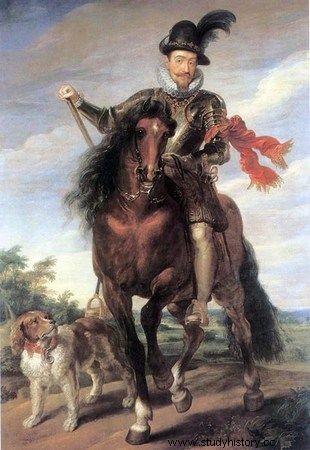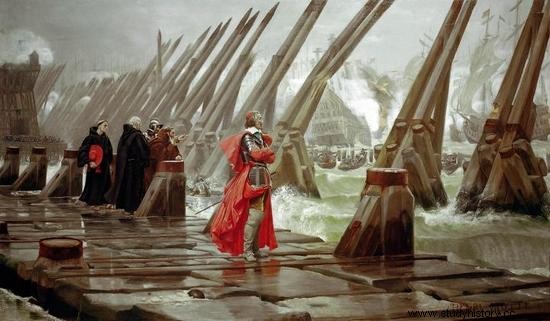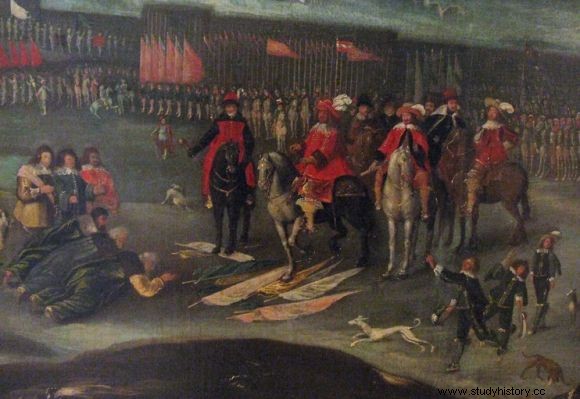They were young, mobile, well-educated, and their veins ran blue blood. It would seem:ideal candidates for employees! Nothing could be more wrong. The sons and brothers of the Polish kings from the Vasa dynasty had their way across the line.
As a rule, the prince was a job like no other:secure employment in the future, free education, lobbies of servants, and trunks full of gold. Well, this could have been the case in normal hereditary monarchies. The Poles, however, decided to conduct a political experiment. From 1573, every king was freely elected, and this made the ruler's offspring… completely redundant. The nobility even made sure that the royal sons, and in the future also the brothers, could not cause trouble to anyone.
The princes of the Vasa dynasty (so all the sons of Sigismund III:Władysław, Jan Kazimierz, Jan Albert, Karol Ferdynand and Aleksander) had to comply with the whole list of prohibitions and restrictions . They were not allowed to perform any public functions in the state, sit in the senate or possess hereditary properties.

Zygmunt III Waza (king of Poland in 1587-1632) had a total of twelve children, including seven sons. Five of them lived to adulthood. According to seniority, they were:Władysław (born 1595), Jan Kazimierz (born 1609), Jan Albert (born 1612), Karol Ferdynand (born 1613) and Aleksander Karol (born 1614).
The first rule actually made them unemployed . The third meant that even if by some miracle they earned something in their lives, they still couldn't invest the money. Officially, they were not even allowed - following the example of today's youth - to look for happiness abroad. The nobility forbade them to leave the country without the consent of the senate ...
They didn't want them on saxes…
Fortunately, at least this last rule was fairly easy to get around. As a result, the young Wazas traveled across Europe along and across. However, not all of them paid off. In general, the whole idea of Polish elections was not understood on the continent - after all, if the kingdom was not hereditary, then the sons of the Polish ruler were not princes at all.
This is exactly the assumption made by Cardinal Richelieu, the gray eminence of France. When the future king of Poland Jan Kazimierz traveled through this country in 1638 on his way to Spain, was ... arrested on suspicion of espionage . He spent the next two years in prison. Of course, the whole thing had its second, political bottom, but the French would rather not dare to take such a step if it were the official heir to the throne.
Humiliation on the same side was also experienced by another prince - Charles Ferdinand. His brother and king Władysław IV sent him to Prussia to welcome his wife, Ludwika Maria, who was coming from the Seine. The meeting immediately turned into a scandal, because the envoy of the French king, Nicolas de Bregy, decided that he was more important than some pretended prince and demanded the first place for himself next to the new queen. Although it eventually subsided, the distaste remained.

Cardinal Richelieu not only fought the Dumasian musketeers, but also arrested Jan Kazimierz Waza.
Władysław IV himself also had an unpleasant adventure many years earlier. When he visited Rome as a young man, he found out that a group of cardinals would love to meet him, but only ... if he greeted them as equals, and not - God forbid! - son of the king. Of course, no meeting took place.
But they went anyway
Perhaps the Polish princes were not welcomed abroad as warmly as they would have expected, but they had to eat something. The problem concerned in particular Jan Kazimierz, who did not expect his brother to take the throne. His career path was described in the "Vasa Dynasty in Poland" by Stefania Ochmann-Staniszewska:
Not seeing the possibility of holding a position in the Commonwealth, he looked for classes abroad, incl. as a colonel of the imperial army in 1635 he fought on the emperor's side with the French and the Swedes; in 1638 he was appointed admiral of the fleet and viceroy of Portugal - these functions were not taken up, however (p. 256).
There was basically only one legal path for professional development in the country:precarious employment, unsafe working conditions, but potentially also large prestigious benefits.
The princes could take part in the war expeditions of the Republic of Poland: This was the main effect of Prince Władysław's participation in public life:he participated in the campaign against Moscow (1617-1618), Turkey (1621), Sweden (1626-1629) ("The Vasa Dynasty ...", p. 257). In turn, his brother Jan Kazimierz fought with Sweden (1629) and Moscow (1633-1634).
If not a sword, at least a rosary…
Of course, not every royal descendant was eager to swing the sword. Since officially the nobility had no influence on the appointment of church positions, the bishop's thrones seemed a tasty morsel for young Vasas. While Zygmunt III was still alive, his sixth son, Karol Ferdynand Waza, became the bishop of Wrocław. He was indeed a strange suffragan: he took the bishopric at the age of only 13 and was never ordained a priest .

Young Władysław Waza won the sympathy of the nobility, among other things, thanks to his participation in all possible military campaigns. The illustration shows the surrender of Muscovites.
As the Wrocław metropolis did not bring him the expected income, with time he became the bishop of Płock. Jan Albert Waza, who was a year older than him, waited at least with a church career until he came of age. He became a bishop at the age of 19, but what a bishop! First, the metropolitan of Warmia, and after the second year in the Polish hierarchy a dignitary - the bishop of Krakow.
What about unemployment benefits?
Apart from the two previously described delinquents - living on the church purse - the princes of the Vasa dynasty were in fact at the mercy of the state. They were not allowed to occupy any positions, and the warrior herself did not bring much profit. This situation fully suited the nobility:it was she who, at the Seyms, decided to throw the Vasa smaller or bigger scraps.
In 1632, only the king's cry persuaded the parliamentarians to grant his sons starosts from which they could derive income. The nobility imposed a number of restrictions:the princes were to wait until the present owner of a given royal land would die, it could not be the border lands or the town starosty. Thus, Jan Kazimierz received the promised starosty only ... in 1643. For 11 years he had to somehow manage on his own.
Władysław Waza, whom the nobility simply liked, was in a better position. In 1626, the Seym awarded him 50,000 zlotys in recognition of the prince's merits for the kingdom ("The Vasa Dynasty ...", p. 258). He was even allowed, by way of exception, to administer, on behalf of his father, lands captured in the wars with Moscow.
Source:
Trivia is the essence of our website. Short materials devoted to interesting anecdotes, surprising details from the past, strange news from the old press. Reading that will take you no more than 3 minutes, based on single sources. This particular material is based on:
- Stefania Ochmann-Staniszewska, The Vasas Dynasty in Poland , Polish Scientific Publishers PWN, 2007, pp. 252-261.
